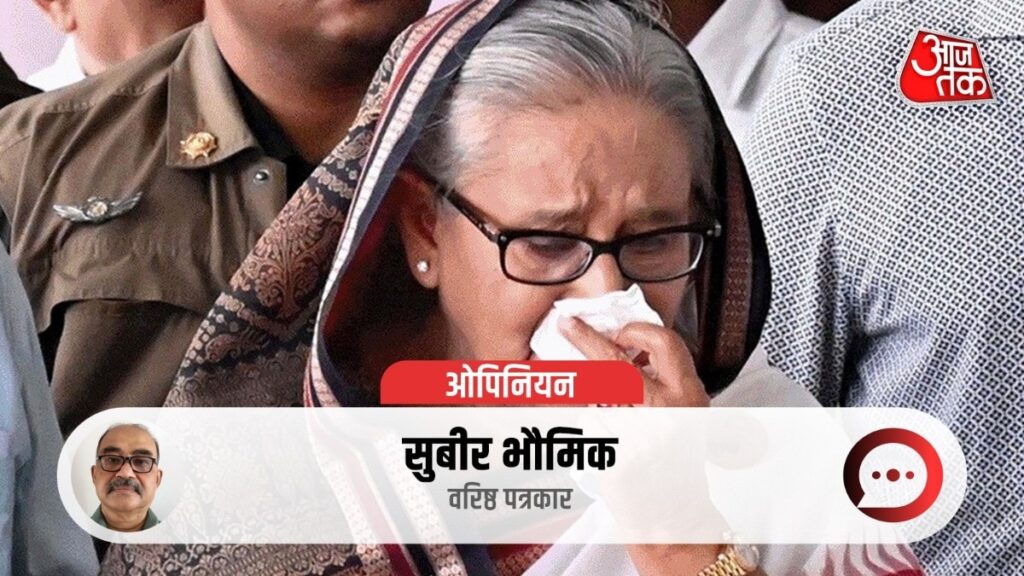Former Bangladesh Prime Minister Sheikh Hasina was suddenly ousted from power under military pressure, after which chaos spread in the country. There is a wave of retaliation against the leaders and workers of the ruling Awami League across the country. People are being killed on the streets. Most of those killed were Awami League people and policemen, but some border guards and some Hindu community leaders were also among the victims. It is clear that the Awami League has lost its ground and now its name is unlikely to be included in any government that comes after Sheikh Hasina in Dhaka.
This became clear when Army Chief General Waqar-uz-Zaman called the leaders of the country’s political parties to finalise the interim government, no one from the Awami League was called. However, leaders of the recently banned Jamaat-e-Islami were also included in it.
Sheikh Hasina’s son Sajeeb Wazed Joy has made it clear that his mother will not return to Bangladesh politics. After this, the Awami League has become completely leaderless, it has become a ship without a captain. Most of its leaders are now worried about their existence.
Related news
- Kashmir’s Lal Chowk painted in the colours of the tricolour, Independence Day fervour seen all across Srinagar
- Kolkata rape-murder case: ‘Our dreams were shattered in one night’, father reveals what was written in daughter’s diary
- Independence Day 2024 Live Streaming: When and where to watch PM Modi’s address on Independence Day? Here are the direct links
- Independence Day 2024: These 10 British brands were once the pride of the British, today Indians rule them!
- Who is 1989 batch IAS Govind Mohan, who has been appointed as the new Home Secretary
What will happen after Sheikh Hasina?
The Bangladesh Nationalist Party (BNP), the political party that has ruled Bangladesh for two full five-year terms since the restoration of democracy in 1991, is seen as the only party capable of forming a government in Bangladesh. The mood in the BNP is quite optimistic as they believe that if not on their own, they can certainly rule in coalition with allies like Jamaat-e-Islami. Khaleda Zia (BNP President), who was imprisoned during Sheikh Hasina’s rule, was released soon after the military took over.
The summoning of Jamaat leaders as well as the decision to release Khaleda Zia are clear indications that the army expects the BNP and Jamaat-e-Islami to play a key role in the post-Hasina environment. There are reports that Khaleda’s son Tarique Rahman, who has been living in London to avoid jail after being convicted in several serious cases, is finally planning to return to Bangladesh.
He played a key role when his mother was prime minister during 2001-2006. If elections are held in Bangladesh soon and the BNP wins, Tariq will be a front-runner for the top post as his ailing mother is likely to step down.
Students supporting Muhammad Yunus
Bangladesh’s powerful Generation Next, the inspiring student-youth forum Students Against Discrimination, may have different ideas, and even the military can’t dispel them.
“This is a historic day for Bangladesh, as a student-led movement to change the civil service quota system turned into a revolution that toppled the 15-year rule of Sheikh Hasina. This may be the first successful revolution led by Generation Z,” says Sabrina Karim of Cornell University.
The student leaders advocated putting Nobel laureate Muhammad Yunus in charge of the interim administration that the military wants to install for a smooth transition from the Hasina regime to elected governance in the future. Yunus had tried to form a political party during the military-backed caretaker rule during 2006-08. He had the support of the US and many who were trying to form a government of the Awami League or BNP, breaking away from Bangladesh’s political binary system.
Some would say that Yunus, if he wishes, can use this Bangla Spring moment to launch himself directly into politics. He can get strong support from anti-Awami elements in the student forum and professional classes and both India and the US may find him more acceptable than the BNP-Jamaat.
Is there a possibility that the protesting students emerge as their own political outfit with an agenda for a new Bangladesh? While there has been no such experiment in Bangladesh or West Bengal so far, in 1985, such an event took place in Assam, where leaders of the anti-foreigner movement walked straight from their hostels to the Dispur secretariat and ruled the state for two terms. However, some student leaders like Nahid Islam may also be co-opted by anti-Awami League parties because of their current popularity.
These parties may also approach some Awami League dissidents who had personal popularity and mass appeal but were sidelined by Sheikh Hasina’s ruling coterie. However, this is more likely to be considered for the distant future rather than the immediate future.
Source (PTI) (NDTV) (HINDUSTANTIMES)
